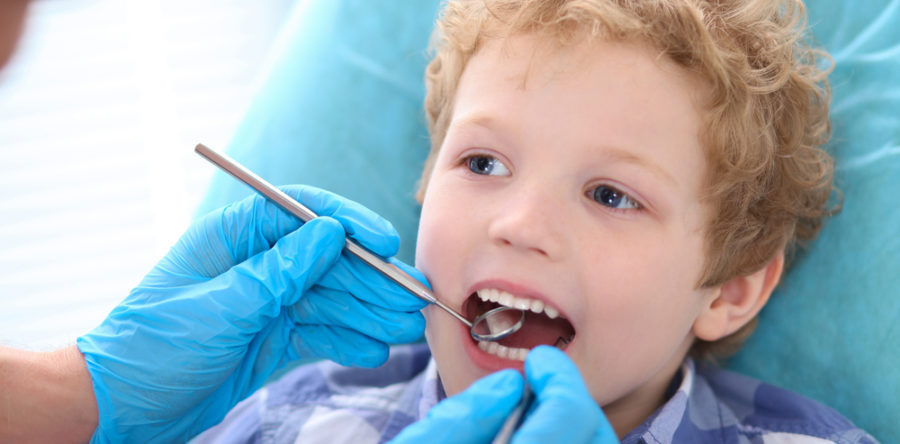Not every parent is prepared to hear their dentist tell them that their child has a cavity. It often comes as a surprise, especially if you have been watching them brush and floss diligently every day. Cavities can be caused by a variety of factors, such as sugar-heavy diets and even hereditary aspects, like having naturally soft teeth, so there’s no reason to jump to blame any one thing. Instead, learning about how cavities form, what you can do when they happen, and how you can prevent more from occurring is what is important.
Let’s get you started on learning how to address your child’s first cavity, and how you can help them avoid more from developing in the future.
How Does a Cavity Form?
Millions of children suffer from tooth decay and cavities every year as a result of high sugar diets, reduced fluoride and calcium, and also transferrable oral germs. The bacteria in your child’s mouth feeds off of sugar, which then produces acids that eat away at the tooth enamel, causing decay. Over time, the bacteria also initiate the production of plaque, which hardens and builds upon the teeth causing more damage to the enamel. This process depletes the calcium of the tooth, which results in a hole known as a cavity.
What to Do
If your child has been complaining about a toothache or pain when eating or drinking, you should take a good look in their mouth. Check for any holes or brown and black staining, as these are often a tell-tale sign of a cavity. If a suspected cavity is found, immediately book an appointment with your dentist to have it checked out and repaired. If they are left untreated, the pain will increase, and it can result in an infection or potential damage to the jawbone and gums.
It’s also important that you listen to your dentist and their recommendations after your child’s first cavity regarding sealants, fluoride treatments, and other oral care methods for improving the oral health of your child.
Help Them Feel Comfortable Before Their Appointment
Going to the dentist can feel scary for kids, especially when they need to have a cavity fixed. To help make the process as easy and comfortable as possible for them, we recommend talking to them about it beforehand. Offer reassurance about their dentist, explain how we help to protect their teeth and smile, and dissipate any of their fears if they’re feeling nervous.
It’s usually best to avoid giving out too many details. Keeping your answers vague will prevent their minds from racing with thoughts that might make them feel even more apprehensive. You can even act out a pretend visit beforehand, playing out what will happen so they can create a positive association with the dentist.
Stay Positive
When parents are nervous about the dentist, children can often pick up on this. And sometimes, a parent’s fear of the dentist can even be projected onto their kids. To help dissipate your child’s fear, try to remain as positive as you can. And when it comes to their appointment, just remember that our dental team has worked with several children before and knows how to keep them as calm and comfortable as possible. So you can let our team explain what the cavity is and how we are going to help them feel better.
Reward Them
Giving your child a bit of praise for being brave or even offering them a little reward after they’ve endured their appointment can be a great way to get them through the appointment without much fuss. This can help them realize that the dentist isn’t so bad, and it will also give their self-confidence a good boost. Incentives are always an effective way to help kids get through some of those seemingly scary appointments, like a cavity.
How to Prevent More Cavities from Occurring
The first step in preventing more cavities from developing in the future is to ensure your child is thoroughly brushing and flossing every day. They should also be attending regular dental check-ups and cleanings.
Limiting or eliminating the consumption of sugary drinks and foods, as well as starch-based carbohydrates that accelerate the growth of bacteria is also essential for the health of their teeth and mouth. Additionally, you should ensure that your kids are brushing with fluoride-based toothpaste - especially if you drink bottled water often or have fluoride-free city water. Fluoride fights against cavity-causing bacteria.
Minimize Sugary Treats
Cavities form when bacteria and plaque build-up – and sugar is what bacteria love to feed off of. If your kids have been indulging in lots of sugary treats and pop lately, we recommend reducing their intake as much as possible. Try substituting processed sugar for natural treats instead, like fruit. And avoid giving any sugary snacks before bedtime.
Monitor Their Brushing
To help your kids understand how to properly brush their teeth and avoid cavities, keep an eye and monitor them as they brush. Show them how to get all of their teeth and gums when using their toothbrush.
When you experience your child’s first cavity, it can make you feel guilty. The reality is that your child has an elevated risk of developing tooth decay today than even a decade ago because of all the sugar and acidic items that are regularly consumed by today’s children. The more proactive you are in staying on top of your oral health, the more likely your child will grow up with healthy gums and teeth. Want more assistance? Contact us and have your child come in to have their dental health evaluated at our family dental centre in Ottawa.


